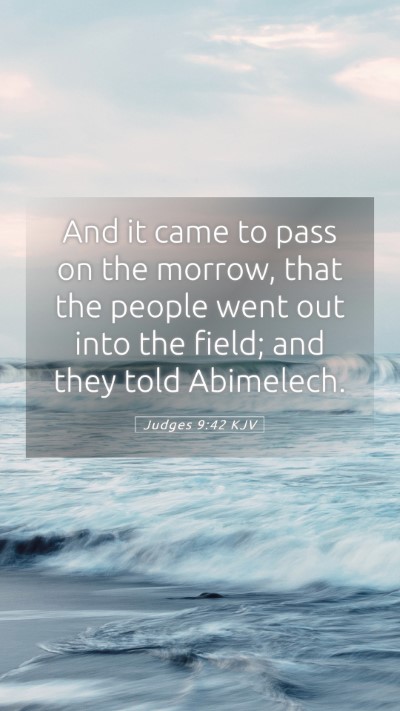Bible Verse Commentary: Judges 9:42
Verse: Judges 9:42 - "And it came to pass on the morrow, that the people went out into the field; and they told Abimelech." (KJV)
Overview: Judges 9:42 narrates a critical moment in the story of Abimelech, the son of Gideon, who sought power through treachery and violence. This passage highlights the aftermath of Abimelech's actions and their implications for the people of Shechem.
Meaning and Interpretation
This verse serves as a pivotal point in the narrative, as it transitions from the previous violent actions to the reactions of the people. The significance of their movement into the field illustrates both a literal and metaphorical shift—a search for justice and a return to normalcy.
Insights from Matthew Henry
Matthew Henry emphasizes that the event described in this verse underlines the consequences of Abimelech's ambition. By saying, "the people went out into the field," it suggests that they were not yet fully aware of the danger they were in. Henry notes that this passage is a reminder of how the ambition of one man can lead to chaos and suffering for the many.
Insights from Albert Barnes
Albert Barnes adds that the people’s actions highlight their naive trust in Abimelech's rule. The phrase "and they told Abimelech" indicates their willingness to seek his counsel, demonstrating how persuasive yet dangerous Abimelech's character can be. Barnes warns readers to be cautious of leaders who rise to power through deceit.
Insights from Adam Clarke
Adam Clarke provides a historical context that is crucial for the understanding of this verse. He reflects on the aftermath of Abimelech's earlier actions against his brothers and how these led to a deep-seated distrust among the people. Clarke stresses the importance of seeing how the people's actions lead to further developments in the narrative, calling it a crucial step toward judgment.
Contextual Analysis
The context of this verse is essential for understanding its implications. It follows a series of events where Abimelech has demonstrated his ruthless pursuit of power, suggesting that his rule is marked by a lack of moral integrity. The people's movement into the field can symbolize their search for truth and justice amidst troubling circumstances.
Historical Context
Judges 9:42 falls within the period of the Judges in Israel's history, characterized by political instability and moral decay. The narrative illustrates the combination of tribal loyalty and conflict, revealing how these social dynamics played a critical role in shaping the people’s choices.
Applications and Reflections
This passage encourages readers to reflect on the consequences of ambition and leadership. It poses significant questions about trust, loyalty, and the pursuit of power:
- What does true leadership look like?
- How can we discern trustworthy leaders?
- What lessons can we take from the actions of Abimelech and the people of Shechem?
Cross References
- Judges 9:1-21 - The rise of Abimelech and his claim to leadership.
- Matthew 20:25-28 - Jesus' teaching about true greatness and servant leadership.
- 1 Samuel 8:5-7 - The people's demand for a king, reflecting a desire for human leadership.
Conclusion
Judges 9:42 serves as a poignant reminder of the consequences of unchecked ambition and the fragility of trust in leadership. The insights from various commentaries provide a deeper understanding of this passage, aiding in Bible study insights and enhancing our comprehension of biblical narratives. As we interpret this verse, it encourages a reflection on our understanding of leadership, power, and the importance of moral integrity.


